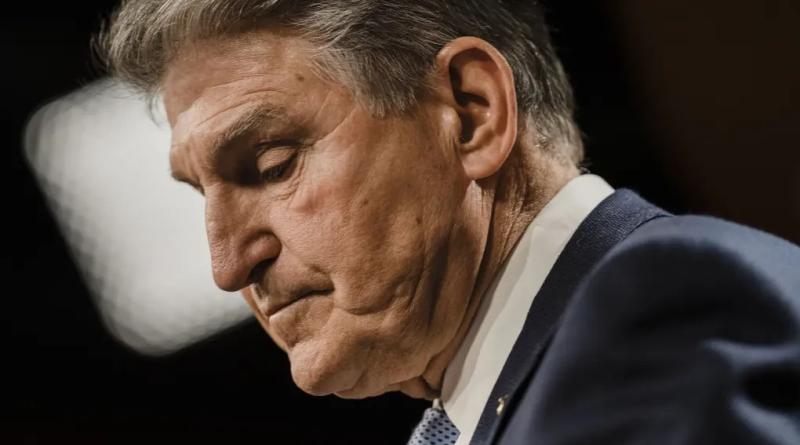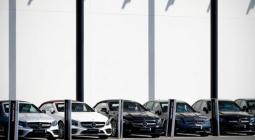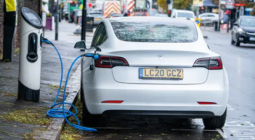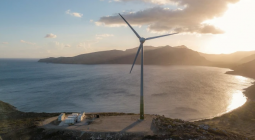Manchin ‘very reluctant’ on electric cars in ominous sign for Biden’s climate fight

Centrist Democrat, who holds key swing vote in US Senate, has poured scorn on the idea of phasing out gasoline and diesel cars.
Faced with rising gasoline prices, many Americans are now looking to switch to an electric car. But the shift away from fossil fuel vehicles has been criticized by Senator Joe Manchin, who has said he is “very reluctant” to see the proliferation of battery-powered cars.
There has been a surge in interest in buying electric vehicles (EVs) in the wake of the war in Ukraine, analysts say, with drivers in the US unnerved by gasoline prices that have surpassed $4.30 a gallon as a result of the conflict and the supply chain issues from the pandemic.
Joe Biden has repeatedly championed the growth of the nascent EV market as a way to tackle the climate crisis, with America’s heavy dependency on polluting cars a major source of planet-heating emissions.
But Manchin, the centrist Democrat who holds a key swing vote in the US Senate, has poured scorn on the idea of phasing out gasoline and diesel cars.
“I’m very reluctant to go down the path of electric vehicles,” Manchin said at the energy conference CERAWeek, held in Houston. “I’m old enough to remember standing in line in 1974 trying to buy gas – I remember those days. I don’t want to have to be standing in line waiting for a battery for my vehicle, because we’re now dependent on a foreign supply chain, mostly China.”
Manchin, who has taken more money in political donations from fossil fuel interests than any other senator, also said he has “a hard time understanding” why the federal government would invest in a network of electric car charging stations, as the Biden administration aims to do.
“I’ve read history, and I remember Henry Ford inventing the Model-T, but I sure as hell don’t remember the US government building filling stations,” Manchin said to applause. “The market did that.”
The West Virginia senator’s criticism is ominous for the White House’s hopes of passing major climate legislation this year. The climate elements of the Build Back Better Act, which Manchin’s opposition has so far stalled, included half a trillion dollars in clean energy tax credits as well as major rebates for electric car purchases to drive up their adoption.
Manchin’s comments also come amid renewed consumer interest in EVs reported by car dealers as some Americans look to bypass the volatility of the global oil market altogether. The past month has seen a strong increase in the number of people searching online for hybrid and battery electric vehicles, according to Edmunds, a car shopping and industry analyst website.
This is a continuation of the broader growth of EVs in recent years “but the major surge in interest of late is certainly more of a reaction to record gas prices sparked by the war in Ukraine”, according to Jessica Caldwell, executive director of insights at Edmunds.
“Anecdotally we are hearing a lot about a greater interest in EVs because of what is going on in Ukraine, but the real test is whether that will last,” said Ed Kim, president of AutoPacific, an auto industry research firm.
Kim said that gas-powered cars built in the US are already full of foreign-made parts. “Joe Manchin represents West Virginia which is dependent upon coal so I believe he has a vested interest in downplaying clean energy,” Kim said.
“Look at what’s happening right now, we are seeing fuel prices we haven’t seen in years because of geopolitical issues. Any measures we take to reduce our reliance on petroleum is good for our economy, our environment and to ensure the country doesn’t come screeching to a halt.”
Previous jumps in the price of gasoline, such as in 2008, saw a corresponding increase in sales of battery-powered and hybrid cars and analysts expect a similar spike as a result of the current crisis. Around half a million electric cars were sold in the US last year, up more than 80% on 2020, with consumers attracted to a slew of new models such Ford’s Mustang Mach-E and the Telsa Model Y.
While traditional car makers such as Ford and GM are now making significant investments in the EV market, demand is now regularly outstripping pandemic-hit supply, meaning the ballooning interest in going electric may end in frustration. “Unfortunately, making an EV purchase is not particularly easy to do right now amid inventory shortages,” said Caldwell.
Owning an electric car is far cheaper than a gas-powered one due to a lower cost of fuel and fewer mechanical problems but the up-front cost of most EVs is typically more than $40,000.
This means they are often out of reach for many low-income Americans who are already forced, due to the car-centric design of US cities and suburbia, to spend a large amount of their money on running a vehicle to go to work and complete other routine trips.
The Biden administration is aiming for 50% of new car sales to be electric by 2030 – last year the total share was around 3% – and industry experts say that major investments will need to be made to hit this target.
“Dependence on oil is funding some of the most brutal regimes in the world today. There’s nothing to suggest any component of an EV would resemble the current national security, environmental and humanitarian cost of oil.” said Nick Nigro, founder of Atlas Public Policy.
“The transition to EVs is inevitable at this point – the timeline is up to consumers and policymakers. The events in Ukraine are a reminder how volatile and destructive a dependence on oil is and that should only accelerate this timeline.”
Author:Oliver Milman
Photograph: Kent Nishimura





